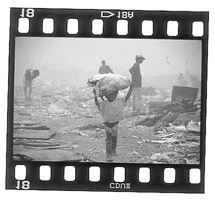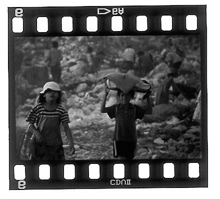An interview with the Japanese director Hiroshi Shinomiya
February 2002
(PDF 271
KB ![]() )
)
Over the past eleven years, Japanese director Hiroshi Shinomiya, 43, has made two long-term documentaries about garbage collectors in Manila: Scavengers and God’s Children. Shortly after he had started shooting for his second film, persistent rain led to a landslide in the Payatas dump. On 12 July 2000, an estimated one thousand inhabitants were buried in the ruins of their huts. Subsequently the government decided to close the dump for future garbage deliveries. The garbage collectors lost their source of income.
In the announcement of your new film it says: “We are convinced that this film will change your system of values.” How?
The film asks the question: What does it mean to be happy? The children on the garbage dump say: If we can eat three times a day and the family stays together we are happy. Death is ever present. In contrast to this, the Japanese have so many dreams and ambitions that prevent them from feeling happy. The less dreams and ambitions one has, the happier one is able to feel.
You believe that the people living on the garbage dump are happier than the Japanese?
I do not know if they are happy, but I know that they feel happiness. It could indeed be that the people living on the garbage dump experience more moments of happiness than does the average Japanese.
Are we to conclude that it is better not to help them?
When after four months finally a truck brings garbage they say: We don’t need anything else, just garbage. Of course this can be true only because before this there was no garbage. The contrast is so sharp. The moment the trucks resume their regular garbage deliveries and they can eat three times a day, they want to send their children to school, and maybe they want to build a nicer house. It occurs to them that they should have themselves vaccinated. People naturally develop more dreams and ambitions as these come within reach, and as someone helping you need to carefully consider which measures to take.
You have filmed people as they were suffering from malnutrition.
Since I am documenting, I cannot intervene and cannot help the people. But when it comes to the point where people are in actual danger, the singular life has more weight than the documentary. I have not personally given money, but I have organized for donations to be given, such as canned food, rice and noodles, and I have handed this over to them. There is this tactical moment: They let us shoot, and so we have to accommodate.
A premature baby was put in an incubator. Who paid for this?
The child had a lung hemorrhage. Before we found out about this, we did not want to cover the hospitalization cost. But when it turned out to be a matter of life and death and it became clear that the incubator can save the child, we took on the expenses.
You left a child with hydrocephalus without treatment, because you considered that its life was worth living as it was?
We had discussed that we would take the child to the hospital after the shooting and would pay for the operation. The child’s father refused this because many wrong decisions are made at the hospital and this might precipitate the child’s death. We asked: If you do not want an operation, what then could you imagine? A wheelchair, they said – which we provided. Part of my film team lives in Manila, and that’s why we said: If you need help, let us know. They still make use of this help.
How did you decide which families to film?
When no more garbage trucks arrived the government handed out relief packages. On the garbage dump, however, there was a region that was not reachable by car, where there was no road. I picked precisely that spot where the rations did not arrive.



The shooting for your first film lasted several years.
At the time I had not yet mastered the language. This is why there were considerable delays in selecting the families. This time, I rented a room on the garbage dump for the time of the shooting, and lived there for two weeks on end. Furthermore I had four or five inhabitants of the dump in the film crew who coordinated appointments and made the detailed arrangements. Of course at times demands were made: Come on, give us this, make us a present of this. Such things I have dealt with through these people. It has made a number of things easier.
When the garbage deliveries are stopped, the inhabitants react with composure. A demonstration takes place peacefully.
In the beginning they still had savings. If they work hard, garbage collectors make the equivalent of an average salary for the Philippines, which corresponds to 600 yen a day [Eds.: slightly more than 7 CHF]. Besides, they did not know how long the garbage deliveries would fail to come. There were lots of rumors and always the hope that the trucks would be back the next day. They would then fall back on relatives and friends who had received donations, and borrow rice from them. I had not expected them to stay so calm, and had pictured brutal scenes, all the way to murder.
Do many children manage to find another job by getting a school education?
This hope does not really exist. In the Greater Manila area over fifty percent of the adult population is unemployed. People know that even with a good education they will not find a job. In fact, many quit school due to this. It is quite usual for families to have lived on the garbage dump for generations.
Has the government considered demolishing the huts for the sake of the inhabitants’ safety?
Of course there were such considerations, but there are no houses these people could go to. Ninety percent of the Philippine population is poor, and unless something happens, this poverty will not change. Beyond the films I have also written books and given talks in order to make the subject known in Japan. After the first film about the “Smokie Mountain” dump there was broad public attention, and the Philippine government provided new accommodation to the inhabitants. This drastically lowered the infant mortality rate.
As long as poverty remains acute, there will be people for whom it is attractive to live on the garbage dumps. Is this not a much more far-reaching problem?
It really is a very difficult problem. One must really listen very carefully to the opinion of those who live there.